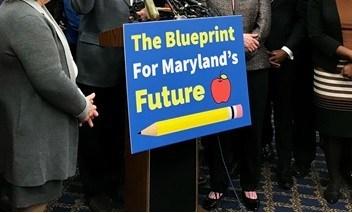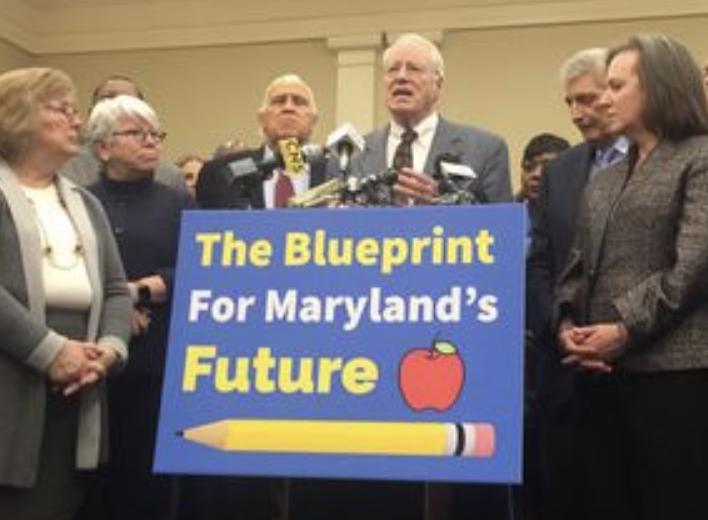It has been an interesting and unsettling week since the introduction and subsequent public hearing on the Blueprint Education Bill (Kirwan). The Maryland Association of Counties took a position that it is the State’s constitutional obligation to fund education and we believe that this new layer of funding should be borne by the State. The counties have been equal partners and funded well above Maintenance of Effort, in addition to taking on teacher pensions and other expenses, while also losing revenues from the State over the years.
On Monday, there was a joint hearing of four committees in Annapolis, which I attended as a member of the Rural County elected officials’ panel. To say the process was fair and all views were given equal opportunity to be heard would be inaccurate, at best.
At the top of the hearing, Chairman Pinsky had announced, “We want to allow democracy and also have efficiency. We have other work to be done. Obviously, this is a crucial piece of legislation for the legislature and the State… We are using a timer today, for the first 7 panels of elected officials, they will have 2 ½ minutes each…”
The hearing began as most would, with the lead sponsors of the bill — Senate President Ferguson and House Speaker Jones — giving their statements. They were followed by Brit Kirwan, the chairperson of the Commission, and Rachel Hise, from the Department of Legislative Services (DLS). They spoke to the merits of the bill and answered selected questions from committee members.
Questions were limited and there were times the Senators and Delegates were cut off from their line of questioning. When a delegate started to ask a question about funding, Sen. Paul Pinsky, chairman of the Senate Education, Health and Environmental Affairs Committee, stopped him and stated, “This is a policy legislation, it’s not the funding piece, obviously it has implications. We’re going to hold the funding issue to when the appropriations, budget and tax and other committees address that issue. We understand that this isn’t going to fall from the sky without a cost, but they’re (Kirwan and Hise) not prepared to answer budget questions, they are here with the policy…”
Really? Not prepared? That statement pretty much sums it all up. No one wanted to hear about valid points of concern, let alone a negative position. During the entire three years of the “Kirwan Commission,” we were all told they were not there to discuss how it would be paid for, only to make policy recommendations. Wait until there is an actual bill in Annapolis, they told us, then we can talk about the fiscal impact. Now it’s the day of the hearing, the bill has been introduced and still the legislators, let alone the people, aren’t allowed to ask fiscal questions!
The main function all along for Ms. Hise from DLS was to put numbers to the policy. She was the lead during all of the Kirwan funding workgroup and Kirwan commission meetings. To say that she wasn’t there to answer financial questions is bizarre. Chairman Kirwan was there to advocate policy, and Ms. Hise, one would think, was there to answer funding questions.
After the initial bill sponsors and Kirwan and Hise had finished, the hearing continued with the county executives and the mayor of Baltimore. They were each given their time and when they were done, I fully expected our panel of rural county elected officials to be called next. Imagine my surprise when that did not happen.
I thought it might have been an oversight and went in search of someone who had the list of people who had signed up to testify. They finally located our panel, listed dead last on the list of 130 speakers. He assured me he would reach out to Chairman Pinsky’s aide. The aide explained that because we were listed as “letter of information,” we were at the bottom. The testimony was all front loaded with Favorable or Favorable with amendments. I further asked if the chairman could consider moving us up because we were elected officials and that they had already heard from the larger counties. The answer was no. A delegate even texted Del. Maggie McIntosh (chairwoman of the House Appropriations Committee) and the answer was still no.
The four of us on the panel who were there weren’t even “opposing” the legislation, we were there to present information about the State’s constitutional obligation to fund education and the impact of tax increases at the local level under this mandate.
So, we sat for hours. By the time the hearing was nearly five hours in, some of us gave up and left. The media had left hours earlier. Many of the Senators and Delegates had left. The room was emptying fast and the elected officials from smaller jurisdictions, with huge impacts, had not been heard. What was the point in speaking to a near empty room?
This is not democracy. Allowing the larger jurisdictions to speak first and not allowing equal time for the other counties is discriminatory. Having only select counties and other supporters fill the first couple hours paints a slanted view of any piece of legislation, let alone the single largest and most costly piece of legislation in Maryland history.
In other news, House Democrats just introduced a bill to cut the state sales tax rate by one penny and expand the tax to most professional services, including visits to the accountant or the beautician, which are currently exempt. This significantly expands the scope of sales tax from just “goods” to include taxing most “services” with the exception of food, medicine, medical services, social work and other non-profits.
Delegate Luedtke said “There is a plethora of proposals for revenue this session, and we have a choice, we can do a whole ton of things at once, which are very complex and only pay for part of the plan, or we can have the courage to go to the people of Maryland and say, ‘If you want great schools this is how we pay for it and this one bill can do it, and it’s a relatively simple, straightforward proposal.’”
People should and will debate whether this massive expansion of sales tax, which is expected to bring in $2.6 billion to the State by 2025 is a good idea, but I will say that at least someone in Annapolis finally realized that Kirwan could not be paid for without an increase in taxes on the average Marylander. That has been my point since I started attending all the workgroup meetings and writing on this topic. If the State legislature does believe that Kirwan is a good idea, then they need to be willing to raise taxes on Marylanders to pay for it and be held accountable. The counties were always going have to increase taxes, primarily property tax, with no choice and very little voice if Kirwan becomes law.
Laura Price serves as Talbot’s legislative liaison to the Maryland Association of Counties and is a member of the Talbot County Council.




